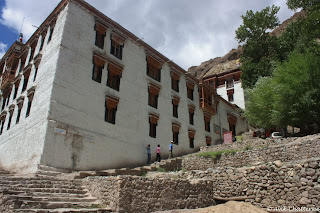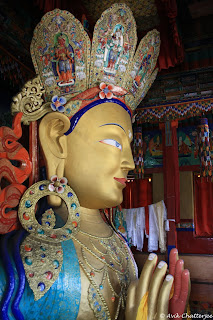Ladakh is rightly called the 'Land of Gompas'. Almost every small village in Ladakh has a Gompas or a Monastery. Monastery or a gompas denotes the building, or complex of buildings, that houses a room reserved for prayer as well as the domestic quarters and workplace(s) of monastics, whether monks or nuns, and whether living in community or alone (hermits).
Hemis Monastery is considered to be the largest monastic institution in Ladakh. It belongs to the Drukpa Lineage or the Dragon Order of Mahayana Buddhism, with His Holiness the Gyalwang Drukpa as its supreme spiritual head. It is located around 45 kms from Leh after crossing the Karo Military check post. The road to Hemis has its own beauty.
Hemis has a wonderful museum which is a treasure house of more than 200 ancient Buddhist Thangka paintings and rare Gandhara icons. There are different murals all over the courtyard.
The courtyard of Hemis Gompa is the stage for the famous 'Hemis' festival which celebrates the birth anniversary of Guru Padmasambhava. There is a huge statue of Guru Padmasambhava in the monastery.
A little ahead of Hemis is the Chemrey Gompa. This is another monastery which belongs to the Drugpa Order.
While returning from Hemis Monastery, we can see Stakna Monastery to the left.
Thikse Gompa or Thikse Monastery is a Tibetan Buddhist monastery of the Yellow Hat (Gelugpa) sect, located on top of a hill, approximately 19 kilometres east of Leh.
The monastery is located at an altitude of 3,600 metres (11,800 ft). It is a 12-storied. One of the main points of interest is the Maitreya (future Buddha) Temple. There is also a 15 metres (49 ft) high statue of Maitreya, the largest such statue in Ladakh, covering two storeys of the building.
Thiksey Monastery also has a Tara temple and shrines of Cham-spring - the protector deity of Thikse. There is also a Gold and Silver Stupa temple.
Shey Palace and the adjacent monastery about 15 Kms from Leh is the next in line located on a hillock east of Leh Town on the same Leh-Manali road. It was built by the king of Ladakh, Deldan Namgyal, also known as Lhachen Palgyigon and was as a summer retreat by the kings of Ladakh. The Royal family later shifted to Stok Palace.
This palace is mostly in ruins now and is not properly maintained. This monastery is famous for its giant copper guilded statue of seated Shakyamuni Lord Buddha. It is about three storied and said to be the second largest statue in Ladakh. The palace also has the largest Chorten (Victory Stupa), the top of which is made of Pure Gold.
Spituk Monastery is situated 8 kms west of Leh. It is situated in the top of a hill at an elevation of about 3,307 metres. The main festival is the annual festival "Gustor Festival" on the 30th day of the first month of the Tibetan calendar. The main image inside the Spituk Monastery is that of Lord Buddha. Along with that is a sacred image of Amitayus, about a finger high in length. There is also an impressive image of Mahakaal. We reached the monastery around 1.30 PM hence the monastery was closed.
Phyang Monastery is another Buddhist monastery located just 15 or 16 kilometres west of Leh. Gang-Sngon Tsedup Festival is the annual festival organized at Phyang monastery.
Other than these other monasteries like Alchi monastery, Likir Monastery and Lamayuru Monastery (or Moonland) is also very famous. All of these are located very near to the city of Leh.
Nubra Valley is also the home of few famous monasteries, like the Diskit Monastery at Hundar and Samstanling monastery at Sumur.
Diskit Monastery also known as Diskit Gompa is the oldest and largest Buddhist monastery (gompa) in the Nubra Valley region. Adjacent to the monastery is a 35 metre statue of Maitreya Buddha.
Karsha Monastery or Karsha Gompa is another Buddhist monastery in the Padum Valley of the Zanskar region.
There are several others which might not be as famous as the ones above and attract less tourist attention...
Hemis Monastery is considered to be the largest monastic institution in Ladakh. It belongs to the Drukpa Lineage or the Dragon Order of Mahayana Buddhism, with His Holiness the Gyalwang Drukpa as its supreme spiritual head. It is located around 45 kms from Leh after crossing the Karo Military check post. The road to Hemis has its own beauty.
Hemis has a wonderful museum which is a treasure house of more than 200 ancient Buddhist Thangka paintings and rare Gandhara icons. There are different murals all over the courtyard.
The courtyard of Hemis Gompa is the stage for the famous 'Hemis' festival which celebrates the birth anniversary of Guru Padmasambhava. There is a huge statue of Guru Padmasambhava in the monastery.
A little ahead of Hemis is the Chemrey Gompa. This is another monastery which belongs to the Drugpa Order.
While returning from Hemis Monastery, we can see Stakna Monastery to the left.
Thikse Gompa or Thikse Monastery is a Tibetan Buddhist monastery of the Yellow Hat (Gelugpa) sect, located on top of a hill, approximately 19 kilometres east of Leh.
The monastery is located at an altitude of 3,600 metres (11,800 ft). It is a 12-storied. One of the main points of interest is the Maitreya (future Buddha) Temple. There is also a 15 metres (49 ft) high statue of Maitreya, the largest such statue in Ladakh, covering two storeys of the building.
Thiksey Monastery also has a Tara temple and shrines of Cham-spring - the protector deity of Thikse. There is also a Gold and Silver Stupa temple.
Shey Palace and the adjacent monastery about 15 Kms from Leh is the next in line located on a hillock east of Leh Town on the same Leh-Manali road. It was built by the king of Ladakh, Deldan Namgyal, also known as Lhachen Palgyigon and was as a summer retreat by the kings of Ladakh. The Royal family later shifted to Stok Palace.
This palace is mostly in ruins now and is not properly maintained. This monastery is famous for its giant copper guilded statue of seated Shakyamuni Lord Buddha. It is about three storied and said to be the second largest statue in Ladakh. The palace also has the largest Chorten (Victory Stupa), the top of which is made of Pure Gold.
Spituk Monastery is situated 8 kms west of Leh. It is situated in the top of a hill at an elevation of about 3,307 metres. The main festival is the annual festival "Gustor Festival" on the 30th day of the first month of the Tibetan calendar. The main image inside the Spituk Monastery is that of Lord Buddha. Along with that is a sacred image of Amitayus, about a finger high in length. There is also an impressive image of Mahakaal. We reached the monastery around 1.30 PM hence the monastery was closed.
Phyang Monastery is another Buddhist monastery located just 15 or 16 kilometres west of Leh. Gang-Sngon Tsedup Festival is the annual festival organized at Phyang monastery.
Other than these other monasteries like Alchi monastery, Likir Monastery and Lamayuru Monastery (or Moonland) is also very famous. All of these are located very near to the city of Leh.
Nubra Valley is also the home of few famous monasteries, like the Diskit Monastery at Hundar and Samstanling monastery at Sumur.
Diskit Monastery also known as Diskit Gompa is the oldest and largest Buddhist monastery (gompa) in the Nubra Valley region. Adjacent to the monastery is a 35 metre statue of Maitreya Buddha.
Karsha Monastery or Karsha Gompa is another Buddhist monastery in the Padum Valley of the Zanskar region.
There are several others which might not be as famous as the ones above and attract less tourist attention...






